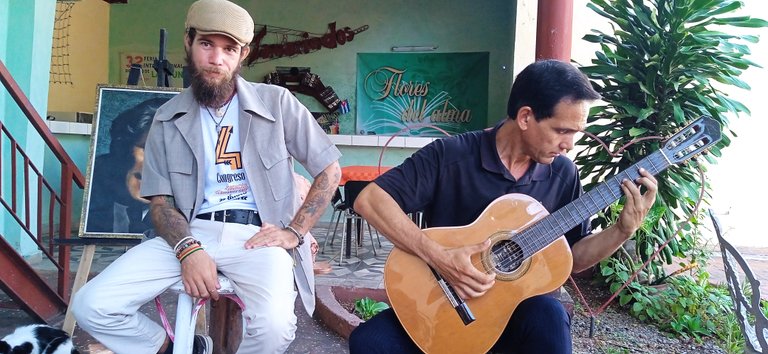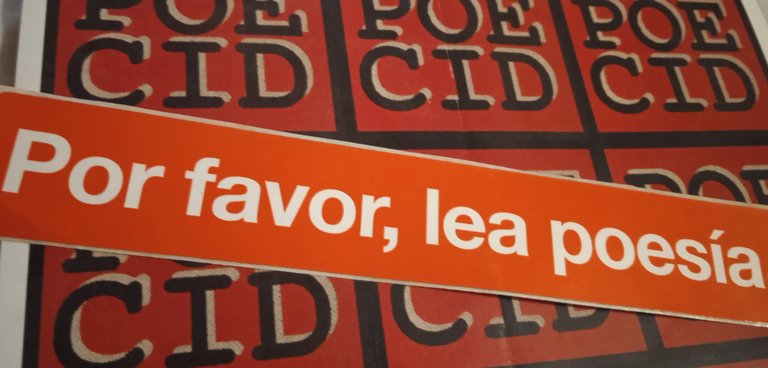Poetry Saves, Literature Saves / La Poesía Salva, la Literatura Salva (eng-esp)
Hello, friends of #Hive.
The other day I was listening to a panel on poetry, and a debate broke out between those who were in favor of the phrase Poetry Saves and those who weren't. Of course, each side presented its arguments. Perhaps you have your own (and if you'd like to share them in the comments, that would be great).

I've always been a man of logic, of firm steps and concrete solutions. But there are cracks in everything, moments when the world blurs and clear answers vanish. It was in one of those cracks that, almost by accident, I discovered that poetry saves. It's not a pretty metaphor; it's a truth as tangible as the ground beneath my feet.
Before, I believed literature was just entertainment, a hobby, an escape. Now I know it's something much deeper: it's a mirror. There are times when the pain, joy, or confusion are so great that they don't fit inside you.
They get trapped, spinning in your head with no way out.
But that time, when you find a poem, a paragraph, a simple line written by someone you never met, in another time and place, and suddenly... there it is. That person put the exact words to your inner mess. They translated everything you can't express.

I once read: I am that which no one can see in the midst of so many people. And it was a direct blow to the chest. Someone had named my teenage loneliness in the middle of a crowd, a loneliness I myself didn't know how to describe.
That's the first benefit, the most crucial: validation. Knowing that what you feel isn't strange, that another human being has gone through it before and survived to tell the tale. That disarms the anguish, takes away its power to make you believe you're broken or alone in the universe.
Poetry and good literature don't just describe; they order the chaos. They take the tangle of indecipherable emotions that drown us and weave them into a narrative with rhythm, meaning, and sometimes even beauty.
Reading about loss in other people's words doesn't erase your own pain, but it puts it in a comprehensible place. It transforms it from a destructive and incomprehensible force into a human, shared, and therefore bearable experience. It's a way to heal without being cured, to find solace without relying on anyone but the open page in front of you.
It's not just about consuming texts (although you can and it's good), but about seeking resonance. Like tuning into an old-fashioned radio, turning the dial until you find the frequency that speaks just for you, at this exact moment in your life.

https://www.facebook.com/share/1FF7YfcFTV/
Sometimes it's a furious verse by Bukowski, other times the serene melancholy of Benedetti, or the existential harshness of Kafka that can save us.
I have a great friend whose saving grace was I am Hope from Sandman by Neil Gaiman. Another Spanish friend who suffers from an autoimmune disease spent almost a year hospitalized and wanted, as a last will and testament (because she thought she was going to die), to leave some stories for her son. However, I not only helped her correct her texts, but I also inspired her to write more.
Today, months go by when she only goes to the hospital for follow-up appointments, and she has already written several books for her son. All thanks to literature.
Literature saved them both.
Me too.
Poetry saves body and soul because it reminds us that, at the deepest level of human experience, we are all connected. It gives us a vocabulary for the soul when ours fails, and offers us an unshakeable refuge within ourselves.
In an often noisy and superficial world, it is the clear whisper that brings us back to what is essential: ourselves.
That's my opinion, friends. If you think differently or have a story, the comments box is open, and we can start a dialogue.
Versión en español
Hola, amigas de #Hive.
El otro día me encontraba escuchando a un panel sobre poesía y se formó un debate entre los que estaban a favor de la frase La Poesía Salva y los que no. Por supuesto, cada bando puso sus argumentos. Quizás ustedes tengan los suyos propios (y si me los dejan en los comentarios, sería muy bueno).

Siempre he sido un hombre de lógica, de pasos firmes y soluciones concretas. Pero hay grietas en todo, momentos en los que el mundo se desdibuja y las respuestas claras se esfuman. Fue en una de esas grietas donde, casi por accidente, descubrí que la poesía salva. No es una metáfora bonita; es una verdad tan tangible como el suelo bajo mis pies.
Antes, creía que la literatura era solo un entretenimiento, un hobby, un escape. Ahora sé que es algo mucho más profundo: es un espejo. Hay veces que el dolor, la alegría o la confusión son tan grandes que no caben dentro de uno.
Se quedan atrapados, girando en la cabeza sin forma ni salida.
Pero ese entonces, cuando encuentras un poema, un párrafo, una simple línea escrita por alguien que nunca conociste, en otro tiempo y otro lugar, y de repente… ahí está. Esa persona puso las palabras exactas a tu desorden interior. Tradujo todo lo que no puedes expresar.

Leí una vez: Yo soy eso que nadie alcanza a ver en medio de tanta gente. Y fue un golpe directo al pecho. Alguien había nombrado mi soledad adolescente en medio de la multitud, una soledad que yo mismo no sabía cómo describir.
Ese es el primer beneficio, el más crucial: la validación. Saber que lo que sientes no es raro, que otro ser humano lo ha transitado antes y ha sobrevivido para contarlo. Eso desarma la angustia, le quita su poder de hacerte creer que estás roto o solo en el universo.
La poesía y la literatura buena no solo describen; ordenan el caos. Toman la maraña de emociones indescifrables que nos ahogan y las tejen en una narrativa con ritmo, sentido y, a veces, incluso belleza.
Leer sobre la pérdida en palabras ajenas no elimina el dolor propio, pero lo sitúa en un lugar comprensible. Lo transforma de una fuerza destructora e incomprensible en una experiencia humana, compartida y, por lo tanto, soportable. Es una forma de sanar sin que te curen, de encontrar consuelo sin depender de nadie más que de la página abierta frente a ti.
No se trata solo de consumir textos (aunque se puede y es bueno), sino de buscar resonancia. Como sintonizar una radio antigua, girando el dial hasta encontrar la frecuencia que habla justo para ti, en este momento exacto de tu vida.

https://www.facebook.com/share/1FF7YfcFTV/
A veces es un verso furioso de Bukowski, otras la melancolía serena de Benedetti, o la crudeza existencial de Kafka puede salvarnos.
Tengo una gran amiga que su frase salvadora fue el I am Hope de Sandman, de Neil Gaiman. Otra amiga española que sufre de una enfermedad autoinmune, se pasaba casi el año completo hospitalizada y quiso, como acto de última voluntad (pues creía que iba a fallecer), dejarle unos cuentos a su hijo. Sin embargo, no solo la ayudé a corregir sus textos, sino que la embullé a escribir más.
Hoy en día, pasan meses en los que solo va al hospital para consultas de seguimiento y ya tiene escrito varios libros para su hijo. Todo, gracias a la literatura.
A ambas, la literatura las salvó.
A mí también.
La poesía salva en cuerpo y alma porque nos recuerda que, en lo más profundo de la experiencia humana, estamos todos conectados. Nos da un vocabulario para el alma cuando el nuestro falla, y nos ofrece un refugio inquebrantable dentro de nosotros mismos.
En un mundo a menudo ruidoso y superficial, es el susurro claro que nos devuelve a lo esencial: a nosotros mismos.
Esa es mi opinión, amigos. Si ustedes piensan de forma diferente o tienen algún testimonio, la casilla de comentarios está disponible y podamos comenzar un diálogo.
View or trade
LOHtokens.@abelarte, You have received 1.0000 LOH for posting to Ladies of Hive.
We believe that you should be rewarded for the time and effort spent in creating articles. The goal is to encourage token holders to accumulate and hodl LOH tokens over a long period of time.
Hay mucha verdad en lo que dices. Y si te digo que a mi lo que me salvó de uno de los peores momentos que he pasado fue, encontrar, gracias a la literatura, un puñado de amigos invaluables. Y conoces a algunos de esos amigos, ya sabes, te hablo denla Rueda.
Un abrazo.